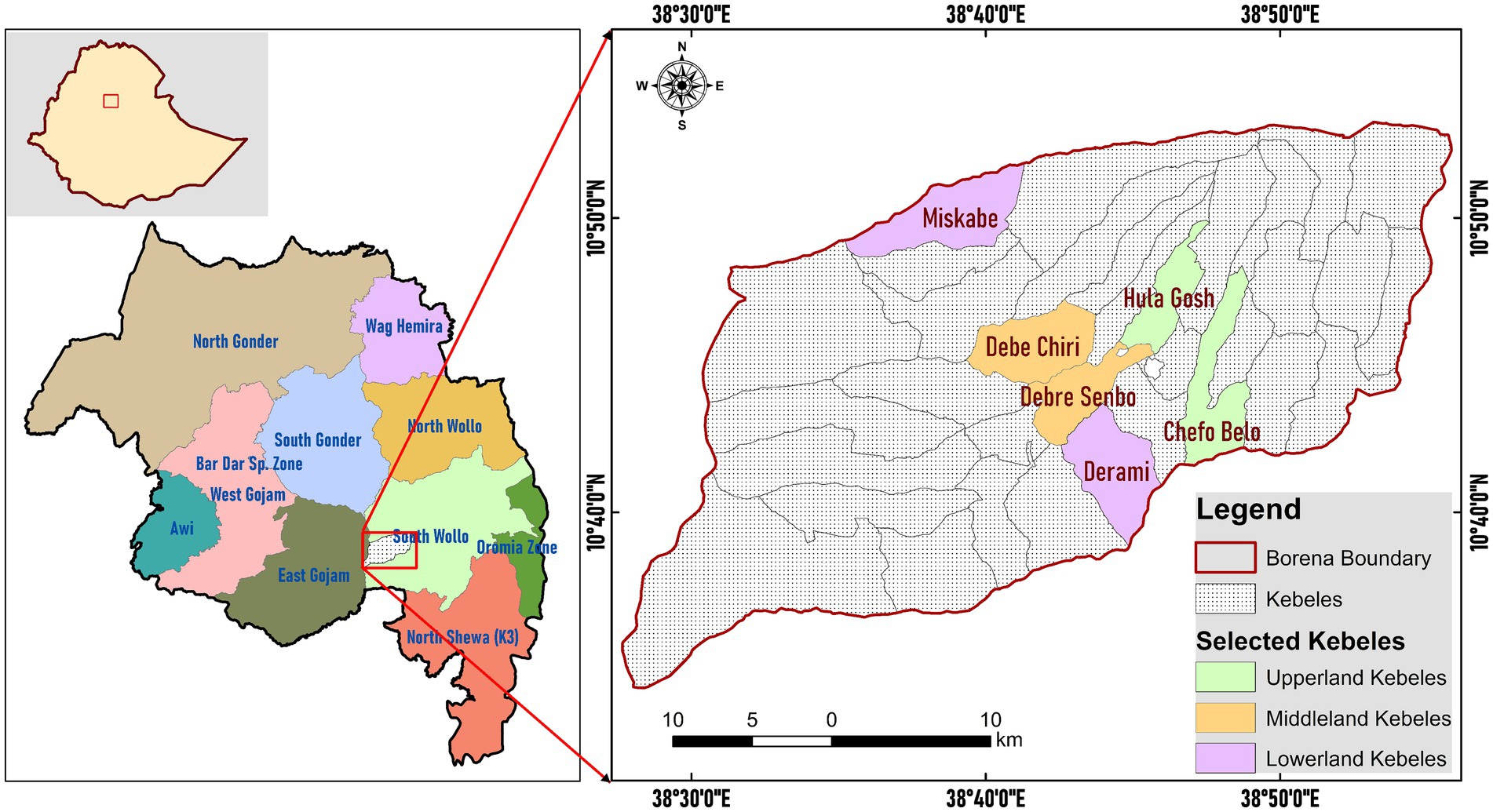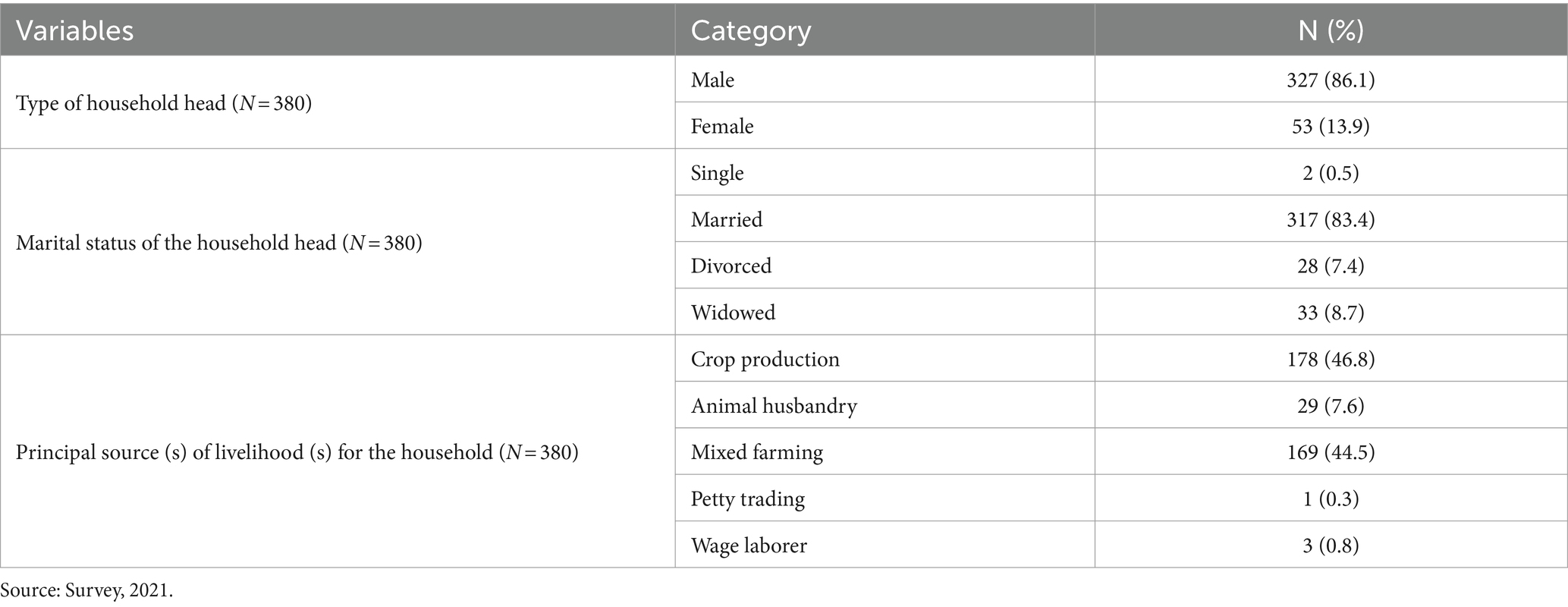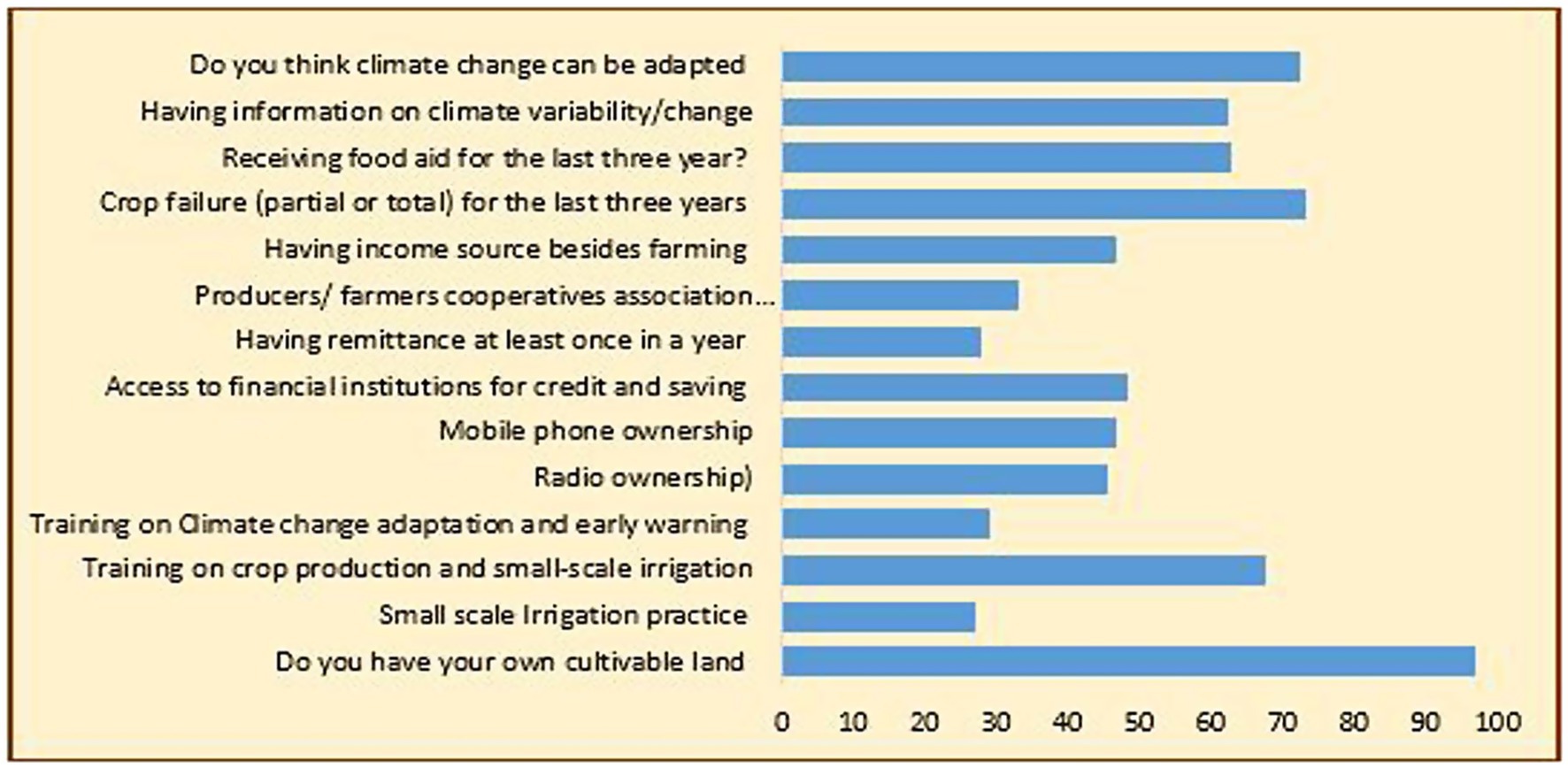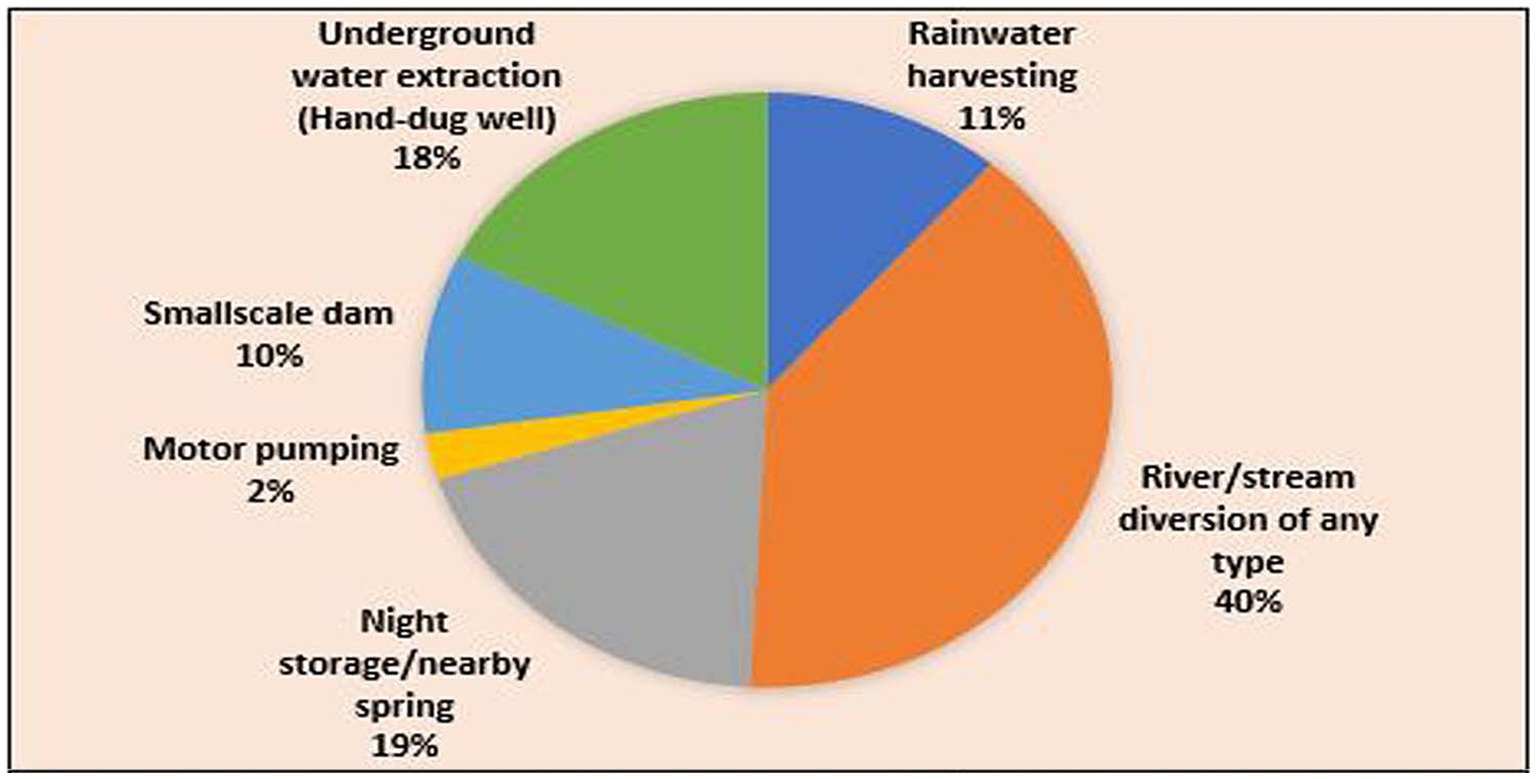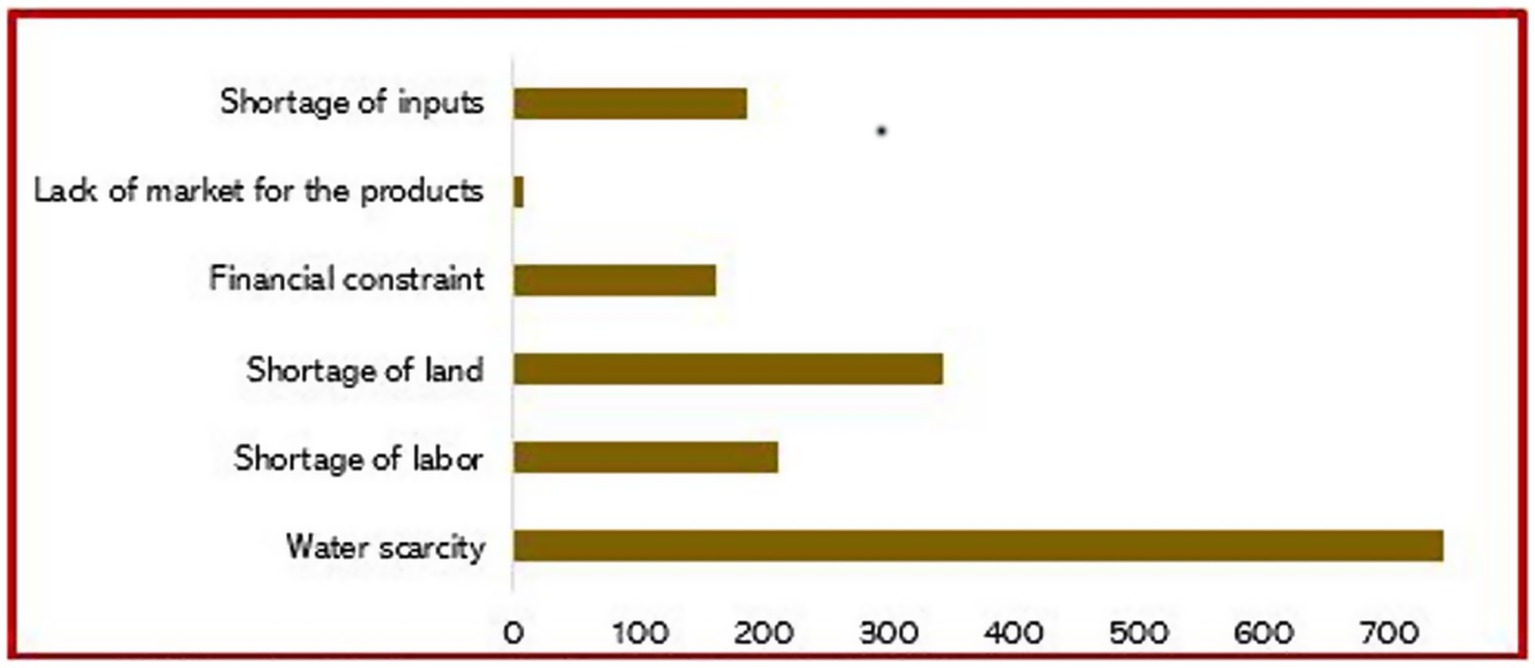- 1Department of Geography and Environmental Studies, Wollo University, Dessie, Ethiopia
- 2Department of Geography and Environmental Studies, Debere-Markos University, Debremarkos, Ethiopia
Introduction: One feasible way to prepare for the adverse effects of climate change in rainfed-dependent livelihood zones is through irrigation. This study examines small-scale irrigation practices and their determinants.
Methods: Using structured survey questionnaires, interviews, and field observations, we used a cross-sectional survey design to collect data from 380 randomly selected households. The data analysis involved percentages, problem confrontation index, Chi-square test, independent samples t-test, and binary logistic regression model.
Results: The findings revealed that river/stream diversion (40%), using nearby springs (19%), and hand-dug walls (18%) were the predominant types of irrigation. At the same time, water scarcity (PCI = 743), land shortage (PCI = 345), and labor (PCI = 212) were the main impediments to irrigation practices. The binary logistic regression model revealed educational status (OR = 1.239, p < 0.05), headship type (OR = 0.246, p < 0.05), age (OR = 0.943, p < 0.05), relative agroecological location (OR = 7.605; 13.929, p < 0.05), family size (OR = 1.936, p < 0.05), land size (OR = 8.609, p < 0.05), responsibility (OR = 2.069, p < 0.05), and crop failure (OR = 0.389, p < 0.05) as factors affecting the adoption of small-scale irrigation.
Discussion: We recommend offering financial assistance to farmers with limited resources to acquire and install labor- and water-saving irrigation systems. Training and extension services on operating and maintaining small-scale irrigation technologies should be provided. Timely information sharing is also necessary to increase the use of irrigation on a small scale as a feasible adaptation to climate change.
1 Introduction
Climate change is one of our day’s most significant development concerns, particularly for smallholder farmers in developing nations primarily relying on natural systems and those lacking irrigation access (IPCC, 2022). Climate change significantly threatens global crop production (Myers et al., 2014). Changing precipitation patterns, more frequent extreme weather events, and rising temperatures have already reduced global yields of major crops like wheat, corn, and soybean by 3–6% since the 1960s (Iizumi et al., 2022). Without robust mitigation and adaptation efforts, climate change could decrease global crop yields by up to 30% by the end of the century. In Ethiopia, where about 90% of food production comes from rain-fed smallholder agriculture, the impacts of climate change on crop production are profound and make the country highly vulnerable to adverse effects of climate change (Alemu and Dessale, 2022). A study in Ethiopia by Solomon et al. (2021), using a general equilibrium model estimated that crop production will be adversely impacted by a changing climate for the coming four decades particularly the production of teff, maize and sorghum will decline by 25.4, 21.8 and 25.2 percent, respectively by 2050 compared to the base period.
Irrigation is a feasible adaptation strategy to mitigate the risks of potential reductions and yield unpredictability brought on by climate change. Those with better access to irrigation will be less vulnerable than those relying solely on rain-fed agriculture (Finger et al., 2011). Thus, developing affordable but water-efficient irrigation systems is one of the most essential and practical approaches to tackling the problems of climate change and low agricultural productivity in Sub-Saharan Africa (Ngango and Hong, 2021; Teha and Jianjun, 2021). According to Alemu and Dessale (2022) and Mume et al. (2023), small-scale irrigation (SSI) is becoming the primary strategy for strengthening and building resilient rural livelihoods in Ethiopia, especially given the nation’s increasingly erratic and unpredictable rainfall patterns. Empirical research demonstrated that efficient irrigation practices could potentially increase employment, providing farmers with more work for more extended periods throughout the year, thus contributing to food security; well-managed irrigation development reduces the adverse effects of high climate variability on agricultural productivity, enhances smallholder livelihood and income, and extends agricultural seasons to counteract population pressure on land and the consequent degradation of soil and land (Awulachew, 2010; Awulachew and Ayana, 2011). According to Tesfaw (2018), irrigation is essential for improving the food security status of rural communities since it lowers the chance of crop failure and increases potential yields in areas susceptible to drought.
Ethiopian agriculture is primarily rain-fed (about 90% of the food production comes from rainfed smallholder agriculture) with limited use of its irrigation potential. Hence, it is susceptible to the adverse effects of rainfall variability (Birhanu et al., 2019). Expanding irrigation farming to support rain-fed agriculture is a crucial tactic. Furthermore, it increases smallholder farmers’ resilience to climate variability’s impacts, reduces farmers’ vulnerability to rainfall variability, enhances their food security and stimulates agricultural intensification (Awulachew and Ayana, 2011). Irrigation practices generate new livelihood opportunities, boost production and productivity, and attain food and nutritional security (MoA, 2011).
According to Zemarku et al. (2022) and Ngango and Hong (2021), SSI also improves the rural community’s general standard of living by boosting income, securing food, meeting societal responsibilities, and reducing poverty. A key component of enhancing the food security of rural households is irrigation technology, which also helps farmers grow various high-value crops and enhances their nutritional standing (Hagos et al., 2009). Amede (2011) has emphasized that irrigated agriculture is a critical intervention in helping developing nations like Ethiopia accomplish their food security goals and eliminate poverty. According to Tesfaye et al. (2008), Amede (2011), Finger et al. (2011), and Birhanu et al. (2019), there are several reasons why irrigation agriculture is vital in drought-stricken Sub-Saharan Africa. These reasons include lowering farmers’ susceptibility to fluctuations in rainfall, raising agricultural productivity per unit of land, which in turn prevents farming from spreading to less productive and fragile ecosystems, enabling communities to create high-value businesses on homesteads, bolstering group action for more comprehensive land and water management, and managing upper watersheds of command areas, among other things. According to Awulachew (2010), the development of irrigation technology may enable higher land and labor productivity, minimize resource degradation, increase a nation’s export base, enhance household nutrition, create more job opportunities, and encourage rural entrepreneurship. Based on a study carried out in Ethiopia’s Tigray region by Getacher et al. (2013), using the Hickman two-stage model and ordinary least square, SSI significantly and favourably improves the income status of rural farm households. Adopting irrigation technology is necessary for raising agricultural yield and rural communities’ food security, as Hagos et al. (2009) mentioned. Above and beyond, it enables smallholder farmers to produce high-value and diversified crops, significantly improving their nutritional and welfare status. A study by Belete and Melak (2018) in the Amhara regional state (Ethiopia) on the impacts of irrigation adoption on the nutritional well-being of children found that children from families of SSI technology adaptors had better nutritional status than their counterparts. Using the propensity score matching approach, the study found that non-adopting households had a higher proportion of underweight individuals than their adopting counterparts. Jambo et al. (2021) revealed that farmers who participated in SSI in Ethiopia were better at their daily calorie intake than their counterparts, and irrigation positively enhanced crop productivity, consumption, and revenue. A study conducted in Ethiopia’s Oromia regional state (Teha and Jainjun, 2021) and Filtino and Godino (Tesfaye et al., 2008) affirmed a significant effect of SSI on households’ livelihood in improving their income and expenditure, together with an increase in expenditure on agricultural inputs. Similarly, a study by Solomon and Ketema (2015) in Fogera Woreda (North-wester Ethiopia) found a statistically significant difference in annual per capita consumption expenditure between irrigation users and non-users, favoring the former. A study in agropastoral community in South Omo of Ethiopia by Asmera and Yidnekachew (2021) uncovered that the income status of irrigation users was found to be much better than non-users since participation in irrigation enabled them to diversify their products and creates opportunity to harvest more than once a year.
According to Mekonen and Berlie (2021), Ethiopia has abundant surface and groundwater resources, which makes the country potentially rich for irrigation agriculture, but the country’s current irrigation development is insignificant. In Ethiopia, only a small proportion of land is irrigated, and its performance is inadequate (Awulachew, 2010; Awulachew and Ayana, 2011; Mekonen and Berlie, 2021). The Central Statistical Agency (CSA, 2021) estimated that the irrigated land in Ethiopia is around 5% and contributes only 3 percent of total food crop production, much lower than the African average. This implies that the land used under irrigation is almost negligible despite its vast potential. A recent meta-analysis study conducted by Girma (2022) in Ethiopia revealed that adopting irrigation technologies is very low (4.7%) compared with the country’s massive potential.
Similarly, Shita et al. (2018) disclosed that the irrigation adoption rate in Amhara regional state was only 6.15%. Though South Wollo is among the most drought-prone areas in the Amhara regional state, and the adoption rate of modern irrigation is meager compared with its potential, in-depth analysis of the critical determinants impacting SSI adoption in the study area is limited. As a result, this study sheds light by investigating the status and quantifying the determinants of the adoption of irrigation in the face of climate change at the household level using the adoption of innovation theory. To better understand how farmers adjust irrigation strategies in the face of climate change, our research adds to the body of literature by taking a quantitative approach. People may adopt, not adapt, or adapt partially different agricultural technologies for various reasons. Leary and Kulkarni (2007) pointed out other possible reasons (socio-economic, biophysical, and institutional attributes) that conditioned people to adopt or not to adopt technologies (see Table 1 for a detailed explanation of hypothesized variables). We looked into the key factors influencing the adoption of SSI in the context of climate change using the innovation-diffusion model as a lens. The innovation-diffusion model, which is based on Rogers’ (1962) research, argues that the main factor influencing an innovation’s decision to be adopted is access to information about it (Wejnert, 2002). The model unanimously acknowledged communication’s role in adopting new technologies; consequently, methods are streamlined through experiment stations, the media, extension, and local opinion leaders (Adesina and Zinnah, 1993).
Nevertheless, according to the adoption-perception model, a prospective adopter’s perception depends on various factors, such as their educational background, experiences in life, and moral principles (Sarker et al., 2013). According to Sarker et al. (2013) and McNeely et al. (2014), the practicality and acceptability of adoption are impacted by the perception of risk and susceptibility to risk. According to the utility-maximizing economic constraints model, the adoption of new technologies is affected by production factors like labor, land, credit availability, and other necessary inputs (Makokha et al., 1999).
2 Materials and methods
2.1 Description of the study area
Borena district is situated in the northcentral part of Ethiopia. According to Abebe (2023) and Nurye et al. (2023), the district is located between 10°34′02″ and 10°53′16”N and 38°27′39″ to 38°54′20″E (Figure 1). Its estimated area is 937 km2. The district is bordered by the Abay River on the west, which divides it from the East Gojjam Zone, Wegdie district on the south, Sayint district on the northeast, Mehal Sayint district on the north, Legambo district on the east, and Sayint district on the west (Abebe, 2023). The center of its administration is Mekane Selam town.
2.2 Biophysical situation of the study area
The district is defined by its varied topography, which ranges from 500 meters to 3,700 meters above sea level. Due to its diverse topography, the district is divided into four traditionally recognized agroclimatic zones: Kola (32%), Woinadega (47%), Dega (20%), and Wurch (1%; Shiferaw and Singh, 2011; Abebe, 2023). The area is distinguished by a summertime rainfall maximum from June to September and intermittent showers from March to May. Mean annual rainfall in the district ranges from 889 to 1,500 mm (Shiferaw and Singh, 2011; Nurye et al. 2023). The district’s mean temperature varied between 14 and 19°C, while its annual maximum and minimum temperatures ranged from 13 to 31°C and −0.5 to 16°C, respectively. Shiferaw and Singh (2011) state that the district’s upper northwest region has the lowest temperature and is primarily Wurch-type, while the southwest region has the highest temperature and is classified as Kolla climatic. There is minimal natural cover in the area due to heavy deforestation. Other native tree species are almost non-existent, except for a few scattered acacia trees, farmer-planted eucalyptus patches, and a few bushes and shrubs (USAID, 2009). Vertisols, rich in clay and have deep cracks when dry, make up most of the soil types in Borena. Even though these soils are suitable for farming, erosion is frequent (Shiferaw and Singh, 2011).
2.3 Socio-economic situation of the study area
The district’s overall population was projected to be 187,915 people in 2017. There were 94,756 females and 93,159 males among them. The district’s population density is 153.96 persons per km2, greater than the South Wollo zone (143.58 persons per km2). Borena’s economy is mainly focused on agriculture, where the cultivation of crops and livestock rearing constitute the primary economic pillars of the local communities in the area (Asfaw, 2014; CSA, 2021). Cultivation of both long and short-cycle crops is entirely rainfed, except in a few select locations that use small-scale, traditional irrigation practices. Alongside growing crops, the communities have a higher livestock asset due to their significance for cash income, milk production, land plowing, and food (Mekonen and Berlie, 2021). Cattle, Sheep, goats, and equines are the primary livestock types raised in the area and contribute significantly to household earnings. However, various factors, including severe frost, hailstorms, limited input availability, soil erosion, water scarcity, and low and irregular rains with late-onset and early cessation, contribute to low agricultural productivity, resulting in chronic food insecurity in the area (USAID, 2009; Mekonen and Berlie, 2021). Borena’s native vegetation is primarily composed of grasslands and woodlands. However, excessive grazing and deforestation have seriously degraded the vegetation cover. Several perineal rivers drain the district, and the Abbay River, which forms its western boundary, offers a sizable potential water supply for irrigation (Shiferaw and Singh, 2011; Asfaw, 2014).
2.4 Research design
2.4.1 Data: type, source, tools, and analysis techniques
We employed a cross-sectional survey design to estimate the determinants of smallholder farmers’ participation in SSI practices in the context of climate change. We collect primary data using a survey questionnaire, actual field observation, and critical informant interview (KII) from February 2021 to May 2021. Data were collected mainly from household heads and concerned government bodies at different levels using pilot-tested structured survey questionnaires (Cronbach alpha value of 0.0.86) and checklists. Well-trained data enumerators collected survey data while the authors conducted field observation and KII. The data was analyzed using Chi-square, independent samples t-tests, mean, and percentage to examine mean differences and associations between SSI practitioners and their counterparts based on various attributes. We used a binary logistic regression model to find the key factors influencing participation in irrigation practices. The prominent problems faced were analyzed using the Problem Confrontation Index. Quantitative analysis was triangulated with outputs of KII and field observation. The multicollinearity problem among independent variables was checked before running the model using the Variance Inflation Factor (VIF) and contingency coefficient. The model’s goodness was checked using Hosmer-Lemeshow and Omnibus tests. We employed statistical Package for Social Science (SPSS ver. 27) software for data analysis. The unit of analysis in identifying determinants of smallholders’ engagement in SSI activities was done at the household level.
2.4.2 Target population and sampling technique
For the cross-sectional survey design, the target populations were smallholder farmers. Samples were using a proportionate stratified random sampling technique. Borena woredas was purposively selected considering its heterogeneity in agroecology and its vast potential for irrigable land but minimal actual practices. Six kebeles (two from each location, upper land, middle land, and lower land, which were classified based on their relative location, not necessarily based on their agroecological division) were randomly selected out of 12 potentially rich kebeles (out of 36 rural kebeles) for irrigation practices based on consultation with Borena woreda irrigation experts. Household heads from the chosen kebeles were selected using a systematic random sampling technique from a list derived from corresponding kebelle administrations. We included 5% as a contingency based on Israel (2012) for the non-response rate and to compensate absentees. Thus, 388 household heads were randomly and proportionately selected from the six kebelles (see Table 1).
Moreover, four individuals from Woreda agricultural offices and four individuals engaged in SSI were included purposively for KII based on their expertise in the field of study and engagement in irrigation economic activity. The sample size determination for the survey study was computed based on Kothari (2004):
Where N is the total target population, n is the desired sample size, Z is the standardized, average deviation set at 1.96 to 95% confidence level; p is the estimated proportion of an attribute that is present in the population (0.5); q is the estimated proportion of an attribute that is not present in the population (1-p; 0.5); e is the degree of accuracy required generally set at 0.05 (5% of acceptable sampling error).
2.4.3 Model specification
2.4.3.1 Binary logistic regression
We applied the binary logistic regression model (Eqs. 1−4) (based on Tabachnick and Fidell, 2013) to identify the significant factors that determine the participation of smallholder farmers in SSI activities.
, then we can write the model as (2)
Pi is the probability of an individual engaging in SSI (dependent variable), and xi’s are independent variables affecting participation in SSI. Therefore, the parameter βi gives the log odds of those participating in irrigation (when xi = 1). We can write the model in terms of odds as:
The dependent variable is the participation of smallholder farmers in SSI (dummy variable 1 = if participated in SSI; 0 = otherwise), while we used several independent explanatory variables (see Table 2).
2.4.3.2 Problem confrontation index (PCI)
The most significant challenges or constraints (problems) faced while implementing the value addition innovations were analyzed using the Problem Confrontation Index (PCI; Uddin et al., 2014) as PCI = (most important problem*3) + medium problem*2) + (less important problem*1)].
3 Results and discussion
3.1 Descriptive statistics of respondents and their associations with SSI practices
Though a total of 388 household heads were considered as a sample for this study, Due to incomplete responses and some technical problems, the responses of 8 household heads (2.1%) were not included in the analysis. As a result, the responses 380 (97.9% response rate) were included in the analysis. Out of the total respondents, only 27.1% have engaged in SSI, while the remaining 72.9% did not participate in irrigation activities during the study period. The finding implied that the SSI adoption rate in the study area is low compared to its potential.
As shown in Table 3, 380 smallholder household heads (86.1% male-headed while female-headed households were 13.9%) participated in the survey. The great majority are married (83.4%). Crop production (46.8%) and mixed farming (44.5%) are the principal sources of livelihood. In contrast, non-farm sources of livelihood, like petty trading and wage labor, are negligible. As displayed in Table 4, the average age of the surveyed household heads was 50.08 years, while the mean years of schooling was 2.93 years. The average family size, mean land size, and livestock assets were 5.56 individuals, 0.73 ha, and 3.92 TLU, respectively. Sampled respondents should travel 1.91 and 1.54 h on average to get to the nearest market and communication centers, respectively. An average of 1677.4 Ethiopian birr is earned from irrigation activities annually. Being in a productive age and having a relatively large family size might be a good opportunity to participate in SSI if facilities are fulfilled.
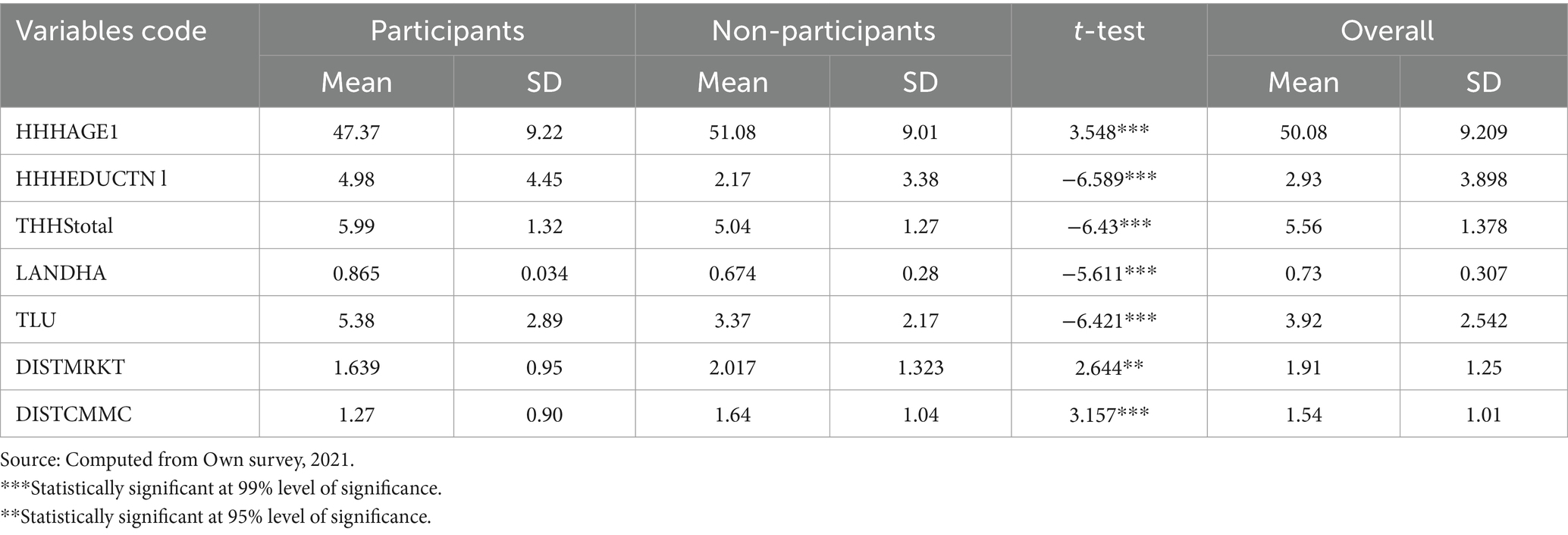
Table 4. Descriptive statistics of continuous variables across adopters (N = 103) and non-adopters of small-scale irrigation (N = 277).
Relatively, most of the respondents have better contact with development agents. Around 96.8% of the respondents have their land. The great majority (67.6%) do have training regarding crop production and SSI, while those having training access to climate change adaptation and early warning were found to be less (29.2%). As a means of information, radio and mobile ownership is worth mentioning as one major factor. Around 45.6 and 46.8% of the respondents do have a radio and mobile phone currently working. In the study area, 48.2% of them utilize financial institutions either for credit or saving; 27.9% have income sources from remittance; around 33.2% are members of cooperative associations. Non-farm sources of income were found to be negligible (Figure 2), but around 46.8% replied that income sources besides agriculture might be the income earned from safety net programs and direct humanitarian supports. Around 73.1% of the respondents had faced either partial or total crop failure, 62.6% had received food aid at least once, 72.6% had information regarding climate change, and 62.5% believed climate change could be adapted. The Phi correlation coefficient (ɸ = 0.395, p < 0.001) revealed that having information regarding the impacts of climate change has a moderate effect on believing in its adaptability. Thus, dissemination of information by whatever means would enable smallholder farmers to believe in the possibility of adapting to the impacts of climate change. It would also allow them to undertake feasible adaptation strategies to overcome the effects of climate change and harness opportunities.
As depicted in Table 4, an independent sample t-test was employed to examine whether there is a statistically significant difference between irrigation users and non-users regarding different covariates. The statistically significant mean age difference was found (t = 3.548, p < 0.001) where irrigation users were found to be younger (M = 47.37, SD = 9.22) as compared with non-users (M = 51.08, SD = 9.01). On the other hand, the mean years of schooling for irrigation users were found to be (M = 4.98, SD = 4.45), which is higher than their counterparts (M = 2.17, SD = 3.38), and the difference is statistically and significantly different (t = 6.589, p < 0.001) at 95% level of significance. Another variable where a significant difference was observed in total land holding, where households having relatively better land holding (M = 0.8648, SD = 0.344 for users and M = 0.6735, SD = 0.28 for non-users) were found to be irrigation users with a statistically significant mean difference in land size at 95% significance level (t = 5.611, p < 0.001). Similarly, households that have a better size of TLU assets were found to be irrigation users than their counterparts (M = 5.38, SD = 2.89 for users and M = 3.37, SD = 2.17 for non-users), and the mean TLU difference was statistically significant (t = 6.421, p < 0.001). Distance from nearby markets was another variable that showed a statistically significant mean difference where those having closest proximity to market centers were found to be more irrigation users (M = 1.639, SD = 0.951 for users and M = 2.017, SD = 1.33 for non-users) and (t = 2.644, p < 0.005). A statistically significant difference in terms of family size was also observed (M = 5.99, SD = 1.32 for users and M = 5.04, SD = 1.27 for non-users) and (t = 6.43, p < 0.001). Generally, the younger, those with better educational status, those households with larger family sizes, those with relatively better land holding and livestock assets, and those residing close to market areas were found to be irrigation users more than the other way round. The Chi-square result revealed that the likelihood of participating in SSI activities is higher for those who are microfinance beneficiaries, those who have remittance income sources, cooperative members, heads having responsibility in kebele, those who believe that climate change is adaptable, those who reside in upper and middle-lands, those having radio (source of information), having training exposure on SSI and having non-farm income sources. The proportion difference was statistically significant at a 95% significance level (see Table 5 for details).
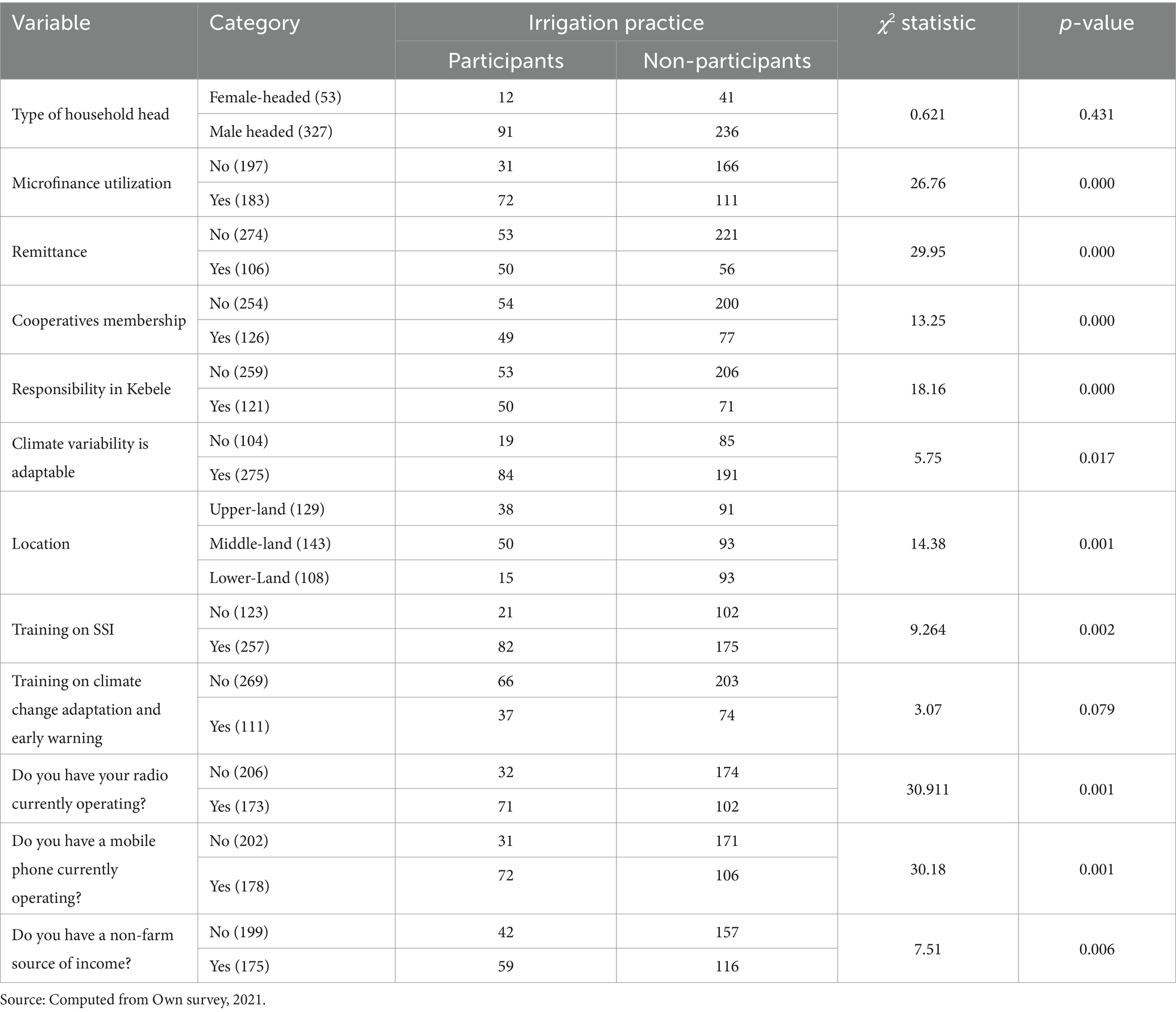
Table 5. Descriptive statistics of the discrete variables across adopters (N = 103) and non-adopters (N = 277).
3.2 Typologies of SSI and major constraints
Figure 3 depicts the top three most commonly practiced irrigation types during data collection: river or stream diversion, night storage, or using nearby springs, and underground water or hand-dug wells. Rainwater harvesting, small-scale dams, and motor pumping are also practiced to a lesser extent. Most of the irrigation types being implemented are not water efficient. Drip irrigation and similar water-efficient irrigation technologies are not practiced at all. An interviewed irrigation expert from the Borena Woreda agricultural office stated that most of the irrigation practices practiced in the Woreda are traditional and not water-efficient by nature. During field observation, we observed a furrow irrigation (Figure 4) where a significant amount of water was wasted. Such irrigation modalities are not recommended where water scarcity is among the significant challenges partially caused by climate change.
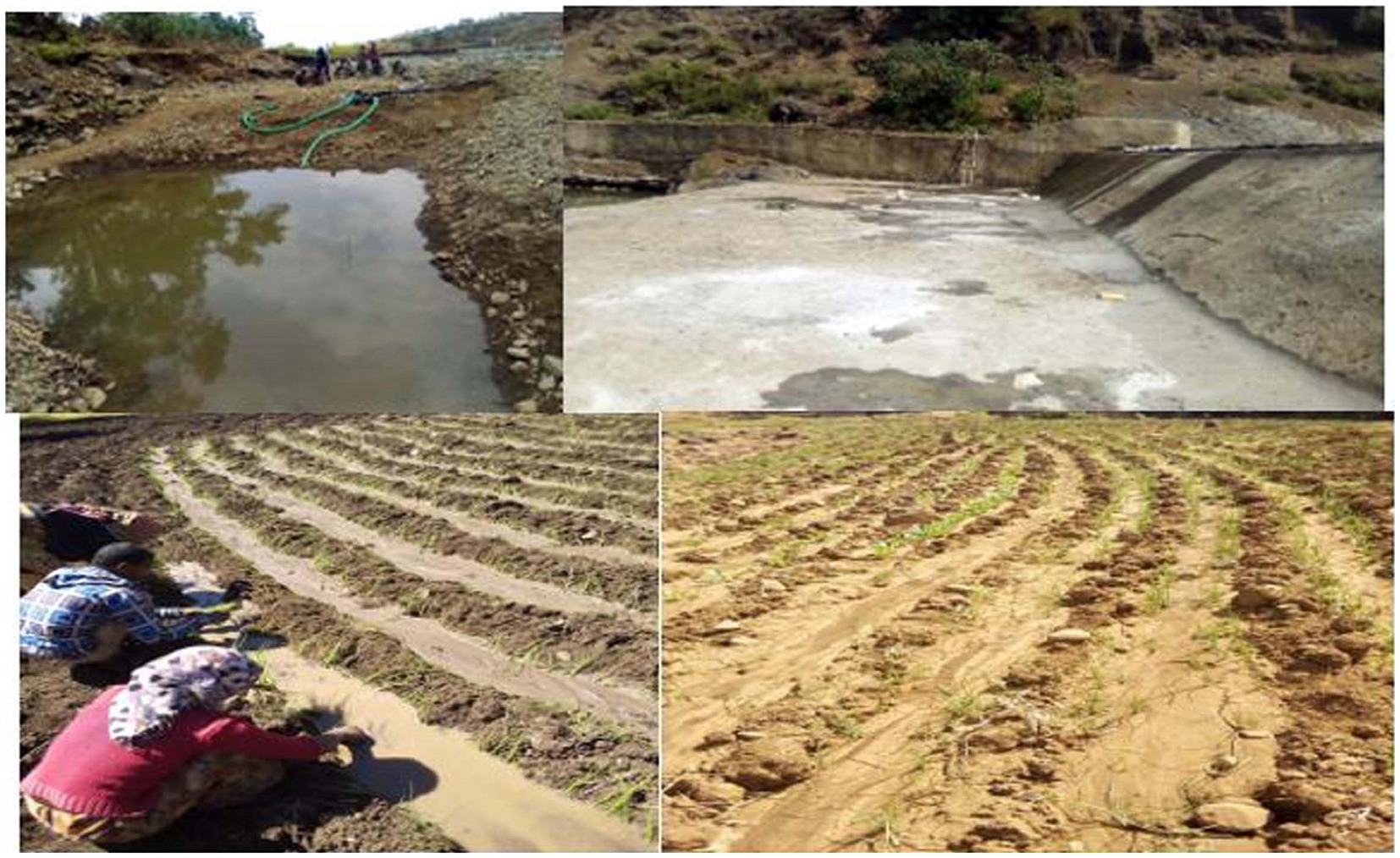
Figure 4. Major types of irrigation in the study area (motor pumping, small-scale dam, and furrow irrigation; photo from Borena Woreda Agricultural Office, 2023).
An interviewed farmer agreed that such irrigation modalities are not water efficient, and according to the respondents, modern irrigation technologies are not affordable. Besides, for small plots of land, securing modern irrigation technologies at a high cost is not profitable from the point of view of economies of scale. As shown in Figure 4, the irrigation practice in the study was constrained by water scarcity, shortage of land, shortage of labor, and shortage of modern inputs. As shown in Figure 5 and observed during field observation, most SSI products are marketable fruits and vegetables. According to one interviewed farmer, sales of fruits and vegetables are crucial in helping cover various costs.
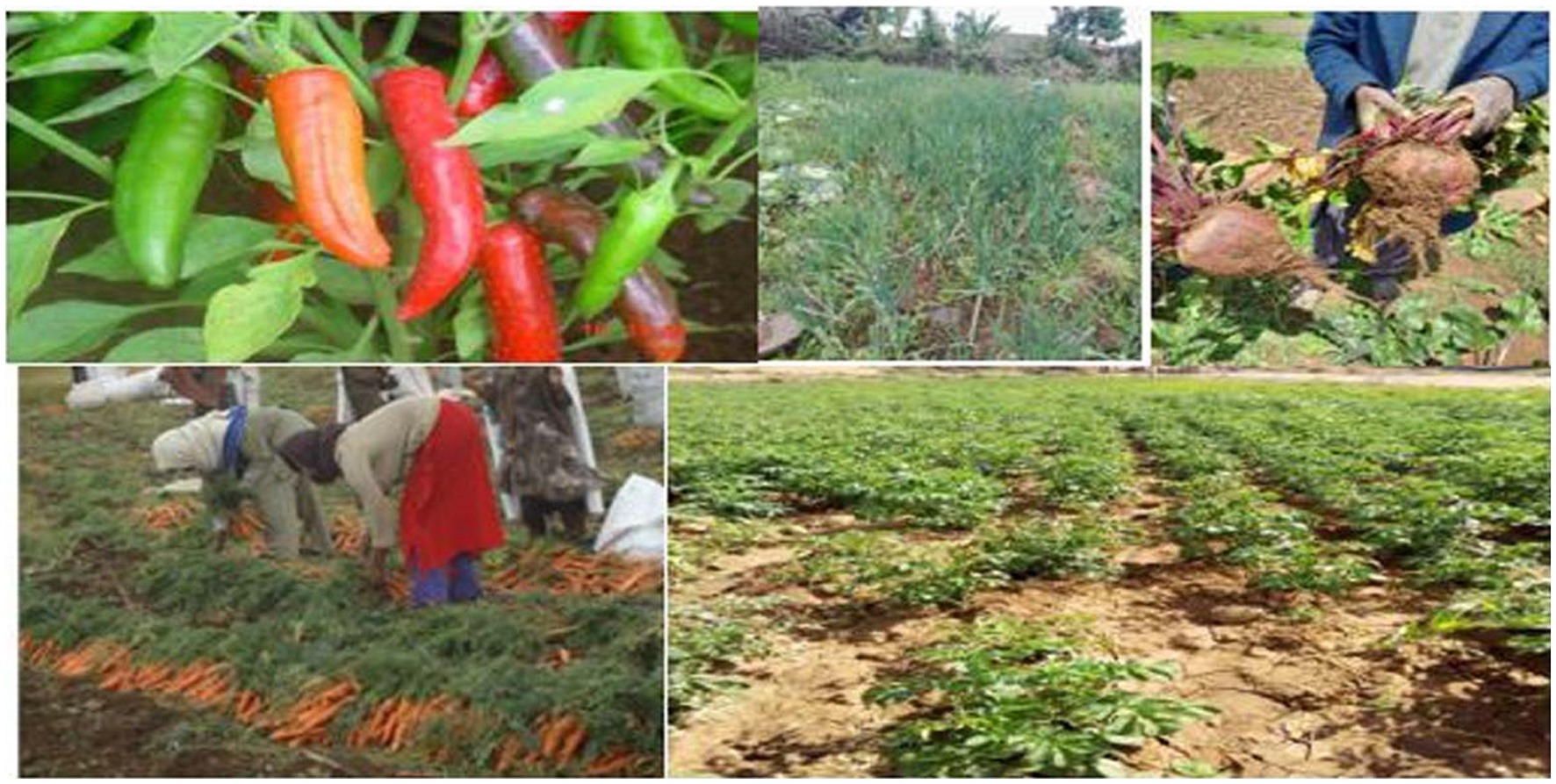
Figure 5. Major types of products produced using irrigation (fruits and vegetables; photo from Borena Woreda Agricultural Office, 2023).
Interviewed farmers engaged in irrigation cited water scarcity as their main critical problem. They added that most water sources have decreased in volume, and farmers are forced to apply rationing methods for their irrigation fields. Another critical constraint mentioned by the district agricultural office’s interviewed farmers and experts is a land shortage. The district is among the highly populated areas of the region where land per capita is minimal. As a result, devoting a certain proportion of land to irrigation is challenging for most farmers. Furthermore, the traditional irrigation system is labor-demanding. So, the shortage of active labor force was another challenge in the study area (Figure 6). In addition, one of the critical issues raised during the interview was the lack of technical expertise regarding the installation, utilization, and maintenance of modern pumping. Almost all key informant participants agreed that the lack of a market for their products is not a problem (most constraints are from the supply side, not the demand side).
3.3 Determinants of SSI utilization
We employed a logistic regression model to estimate the factors that determine farmers’ participation in SSI. Multicollinearity diagnosis for continuous explanatory variables and degree of association for discrete variables were inspected using VIF, tolerance statistics, and the contingency coefficient. The maximum VIF and contingency coefficient found were 1.602 and 0.32 (see Annex 1), respectively (both are below the required threshold to consider the multicollinearity problem), which evidenced the appropriateness of the independent variables for running binary logistic regression. Correlation tests and contingency coefficients were used to screen out variables strongly associated with the dependent variable. Five variables with a correlation coefficient below 0.3 were omitted from the analysis. Accordingly, 17 variables (out of 22 candidate variables), assumed to be associated with the participation of smallholder farmers’ irrigation strategies, were included in the model (see Table 6). Among the variables, eight were statistically significant at 0.05 alpha level.
The model classification ascertained the model’s goodness-of-fit, where 84.8% of respondents were correctly classified by the model (72.6% in the constant-only case). The Omnibus Tests and −2 log-likelihood ratio test revealed that the estimated model, including a constant and the set of explanatory variables, fit the data better than the model containing only the constant. This suggests a stronger correlation exists between the odds ratio (or log of odds), the likelihood that a particular factor will influence a farmer’s decision to participate in irrigation, and the explanatory variables in the model. These factors significantly contribute to explaining smallholder farmers’ influence in adopting SSI. The overall estimated model has remarkable explanatory power, although some coefficients were insignificant when considered individually. The highly significant Chi-Square result, the overall percentage of correct prediction, and the Pseudo R2 value (Cox and Snell’s of 0.366 and Nagelkerke of 0.53) all support this claim.
Moreover, a non-significant result of the Hosmer-Lemeshow goodness-of-fit test (χ2 = 12.741, p = 0.121, df = 8) revealed the model’s appropriateness (well–fitting). Using the VIF and tolerance statistics, multicollinearity diagnosis for continuous explanatory variables was also examined. The outcome showed no issues with multicollinearity among the explanatory variables. Furthermore, the degree of association between each dummy/discrete variable was also assessed using the contingency coefficient. The estimated coefficients of the logit model are presented in Table 6. As indicated by the χ2 statistic, the likelihood ratio statistics is significant at 1%. This suggests that all the variables in the logit model are jointly significant in influencing smallholder farmers’ decision to partake in irrigation activities. Finally, adoption probability is estimated using the Adjusted Odd Ratio (AOR).
The educational level of the household head is among the factors determining the adoption of SSI (Ngango and Hong, 2021). As predicted, it was found that the head of the household’s education has a positive and significant effect at the 0.05 alpha level, suggesting a positive relationship with the adoption of irrigation. This indicated that, compared to their peers, household heads with greater levels of education are more inclined to practice SSI. If all else remains equal, an additional year of education could raise the likelihood that smallholder farmers will use irrigation by 1.239% (Table 6). This result is consistent with Belete and Melak (2018), Zegeye et al. (2022), and Gemeda et al. (2023). If they receive education, smallholder farmers may be better equipped to process and apply vital information from various sources. Higher-educated people are more inclined to adopt new technology since they understand their relevance better. Besides, they can look at market opportunities and have a better likelihood of taking calculated risks. Higher educated farmers are more likely to choose better adaptation strategies in response to climate change; they have a greater degree of knowledge and are therefore more able to comprehend and respond to changes that are anticipated; they are more adept at predicting future scenarios; and, overall, they typically have access to opportunities and information that may encourage climate change adaptation (Kumasi et al., 2017).
The sex of the household head is worth mentioning as a determinant factor in technology adoption, favoring male-headed ones. In this study, the likelihood of female-headed households participating in SSI activities is statistically and significantly lower than (24.6%) male-headed ones at a 95% significance level (Table 6). The finding coincides with Teha and Jainjun (2021) and Zemarku et al. (2022). This might be due to a difference in information, extension, and asset access, where males are better than females. Besides, women are more engaged in household chores like cooking and childcare activities; in most cases, they are endowed with fewer resources and less exposed to new information, which hampers their adoption rate of new technologies. Gender plays a role in adaptation decisions (man-headed households often implement some adaptation strategies). Since women are more involved in household chores and men perform a significant portion of outdoor farming activities in developing nations, male-headed households have greater access to farming experience and knowledge of various adaptation strategies (Nigussie et al., 2014). A study in Ethiopia found that women handle almost all household chores, leaving little time for repairs or other financial activities (Nigussie et al., 2014; Mare, 2017).
Moreover, Mare (2017) has shown that women in Ethiopia encounter obstacles when obtaining loans, inputs, extension services, and information—all essential when undertaking adaptations. The female participant in KII, age 52, holds a distinct perspective. This respondent says that having a male or female head of household is not a significant obstacle; instead, because traditional irrigation methods are labor-demanding, it is more important to have an active labor force in the family. Irrigation activities are common among families with more productive labor forces.
By its nature, SSI practice is a laborious activity where younger ones are expected to be engaged more. The impact was statistically significant at a 95% significance level. As predicted, the probability of SSI declines with household age. The likelihood of participation decreases by about 9.45% when the age increases by 1 year (Table 6). A similar finding was reported by Teha and Jianjun (2021), Zemarku et al. (2022), and Gemeda et al. (2023). The reason for the inverse relationship between adoption and age is that older farmers are less likely than younger farmers to adopt new agricultural technologies because they are risk-averse and conservative. However, our finding differs from Feyisa (2020), where a positive association was reported.
Location is another covariate considered a possible factor affecting the probability of households’ engagement in irrigation, mainly due to differences in the availability of resources. In this study, location was found to significantly affect the likelihood of participation in SSI, where households in middle and upper lands participated more in irrigation than those residing in the lower lands due to better availability of water resources and rainfall amount. The probability of households in the middleland and upper-land participating in SSI was 13.929 and 7.605% more likely than those living in the lower-land, respectively, at a 95% significance level (Table 6). Our finding corroborates with Geddafa et al. (2021), Zemarku et al. (2022), and Zegeye et al. (2022). This negative association implies that the farther the plot of land, the lesser would-be farmers’ initiative to participate in SSI due to the opportunity cost of training to and from an irrigation plot, and proper surveillance of the farm activities might be challenging when distance increases from the homestead.
SSI activity is labor demanding sector. At the 95% significance level, the size of the entire household influenced people’s participation in small-scale activities. Participation probability increases at 1.936% when family size increases by one unit (Table 6). The result is consistent with Geddafa et al. (2021), Zegeye et al. (2022), Zemarku et al. (2022), and (Gemeda et al., 2023) that reported a positive relationship between the labor force of a family and the propensity of adopting irrigation. Having a larger family size encourages participation in diversified activities, including irrigation. A different result was revealed by Challa and Tilahun (2014), where family size was negatively and significantly associated with the rate of adoption. Although the relationship between family size and the adoption rate of agricultural technology adoption is not clear-cut, it is reasonable to assume that a large labor force may accelerate the adoption rate of labor-intensive technologies. As SSI participation requires more labor, a household with a more significant labor force is more likely to adopt irrigation than one with a smaller labor force. In countries like Ethiopia, family labor is among the most widely utilized inputs for irrigation. It is primarily used for plot preparation, canal construction, diverting water from rivers, weeding, watering, and other purposes. As a result, households with a higher labor force are more likely to adopt irrigation than households with a smaller labor force, and SSI participation requires more labor.
Land size matters for diversifying income sources in rural areas. The participation of households with better land size was higher, and the result was statistically significant at a 95% significance level (Table 6). An increase in land size by 1 hectare increases the likelihood of engagement in irrigation by about 8.609%, citreous paribus. A similar finding was reported by Challa and Tilahun (2014), Belete and Melak (2018), Feyisa (2020), and Gemeda et al. (2023). More productive and profitable households may arise from better arable land and be more likely to embrace new agricultural technologies. Furthermore, it might be possible to distribute failure risks with increased farmland. Both interviewees concurred that the district’s meager land per capita makes it difficult for farmers to diversify their agricultural operations, including setting aside a portion of their land for irrigation. Having responsibility in local administration exposed individuals to better information regarding market and capital, which, in turn, encouraged them to participate in income-generating activities like irrigation. Keeping all other factors constant, being a member of local administration has increased the probability of engagement in irrigation by 2.069% at a 95% significance level (Table 6). Having responsibility in local administration creates social capital and trust to secure input, information, and finances, which are crucial in increasing the probability of participation in SSI. A similar finding was reported by Feyisa (2020) and Ngango and Hong (2021). The plausible reason is that participation in local leadership can help to have more access to financial resources and information, share experiences with others, and create a more social network. Our result differs from Teha and Jianjun's (2021), where a non-significant relationship between social association membership and SSI adoption was reported.
On the other hand, the incidence of crop failure due to different factors discourages farmers from engaging in crop production and might shift towards non-farm income sources. We found that the likelihood of engaging in irrigation decreased by about 38.9% whenever the household faced crop failure problems (Table 6). Our result is in line with the findings of Ngango and Hong (2021) and Gemeda et al. (2023), where individuals who faced crop failure due to climate-related hazards and those who perceived similar risks tend to shift into non-agricultural activities. This probably might be due to a shift into non-farm activities whenever there is frequent crop failure, which discourages smallholder farmers and tends to participate in non-agricultural sources of income as a risk aversion strategy. The impact of most institutional factors (training, radio ownership, distance from market, microfinance access, association, having non-farm income source, remittance, TLU) was found non-significant in the study area through hypothesized to have positive impacts in determining the likelihood of participation of farmers in irrigation activities.
4 Conclusion and policy implication
Food security and agricultural productivity are threatened by climate change, particularly in areas with limited water resources and unpredictable rainfall. SSI is a promising adaptation strategy to address these challenges and enhance agricultural communities’ resilience. It increases water use efficiency, enhances crop yield, diversifies crops, and empowers smallholder farmers. By implementing supportive policies and capacity building, governments can empower farmers and improve agricultural resilience by expanding SSI in a changing climate. Based on these arguments, we tried to estimate the factors regulating SSI in one of the drought-affected areas of Ethiopia using a binary logistic regression model. The primary irrigation modality implemented in the study area is the traditional furrow irrigation system, mainly through river diversion. Such irrigation systems are not water efficient and are labor-demanding. Water-efficient and labor-saving irrigation technologies are rarely utilized due to their affordability and limited technical know-how, mainly in installation and maintenance. The study area is among the most populated areas of the country, where land per capita is small. Non-farm sources of livelihood are rare, whereas rainfed agriculture is the predominant livelihood type. Though training given regarding SSI is relatively better, those having training access on climate change adaptation and early warning were found to be less. The principal problems mentioned while practicing SSI are water scarcity, lack of land, and shortage of active labor force.
Based on the independent samples t-test and Chi-square test results, households with larger family sizes, younger farmers with higher educational levels, relatively better land holding and livestock assets, and those close to market areas were more likely to use irrigation than the opposite. Furthermore, people who believe that climate change is adaptable, live in upper and middle-class areas, have access to radios as a source of information, have received training on SSI, have non-farm income sources, are cooperative members, heads of kebeles with responsibilities, and are beneficiaries of microfinance are more likely to engage in SSI activities. The binary logistic regression model’s findings confirmed that the main determinants of the adoption rate of SSI are headship type, the household head’s educational attainment, age of the head, relative agroecological location, farmland size, family size, and administrative responsibility in the local community where the interplay of economic constraint and innovation-diffusion model seems more influential in the study area.
Our findings have several policy implications. Most irrigation modalities practiced in the study area are traditional, not water-efficient, or laborious. As a result, government and development agencies should provide financial support, particularly for resource-constrained farmers, to purchase and install water-efficient and labor-saving irrigation technologies. Ensuring SSI technologies’ effective utilization and sustainability requires farmers to receive training and extension services on their design, operation, and maintenance. It was discovered that believing in the adaptability of climate change was correlated with knowing its effects. Therefore, increasing SSI as a viable option for adapting to climate change would require timely information for small-scale farmers. Further intervention conserving SSI and climate change adaptation strategies should consider the factors regulating the adoption rate of different strategies.
4.1 Limitation of the study
Since the study depends on cross-sectional data, it did not enable the examination of the dynamism through time and limits the control of selection bias due to problems of unobserved heterogeneity. As a result, further research with panel data is recommended to better capture the effects of irrigation over time. Future research should pay particular attention to the impacts of irrigation on income, poverty level, consumption expenditures, and food security status. Besides rigorous irrigation potential assessment, GIS and remote sensing techniques are essential.
Data availability statement
The original contributions presented in the study are included in the article/supplementary material, further inquiries can be directed to the corresponding authors.
Ethics statement
Before conducting the study, written permission was obtained from South Wollo zonal administrative offices. During the survey, an official letter was written from the district agricultural office; informed verbal consent was obtained from each respondent (survey participants), while written consent was secured from key informant participants. Besides, confidentiality was maintained by giving codes to each respondent rather than recording their name. Study participants were informed that they had full rights to discontinue or refuse to participate. Hence, all participants throughout the research, including survey households, enumerators, supervisors, and key informants, were fully informed of the study’s objectives. Besides, the study complies with all the necessary research regulations and ethical considerations.
Author contributions
AAE: Methodology, Writing – original draft, Writing – review & editing. AAM: Methodology, Writing – original draft, Writing – review & editing.
Funding
The author(s) declare that no financial support was received for the research, authorship, and/or publication of this article.
Acknowledgments
We thank all participants (farmers, experts, and data enumerators) for their valuable contribution to providing the necessary information and collecting the survey data.
Conflict of interest
The authors declare that the research was conducted in the absence of any commercial or financial relationships that could be construed as a potential conflict of interest.
Publisher’s note
All claims expressed in this article are solely those of the authors and do not necessarily represent those of their affiliated organizations, or those of the publisher, the editors and the reviewers. Any product that may be evaluated in this article, or claim that may be made by its manufacturer, is not guaranteed or endorsed by the publisher.
References
Abebe, M. K. (2023). Rural Households' livelihood diversification activities: a case study from Borena District, north Central Ethiopia. J. Environ. Issues Climate Change 2, 1–11. doi: 10.59110/jeicc.v2i1.86
Adesina, A. A., and Zinna, M. M. (1993). Technology characteristics, farmers' perceptions, and adoption decisions: a Tobit model application in Sierra Leone. Agric. Econ. 9, 297–311.
Alemu, M., and Dessale, M. (2022). Impacts of small-scale irrigation on rural households' income in northeastern Ethiopia. Sustain. Water Resour. Manag. 8:15. doi: 10.1007/s40899-021-00600-1
Amede, T. (2011). Agricultural water management systems in the context of climate change in sub-Saharan Africa (SSA) in strengthening capacity for climate change adaptation in the agriculture sector in Ethiopia. Proceedings from National Workshop held in Nazareth, Ethiopia. Climate change forum (Ethiopia); 5–6 July 2010: Nazareth, Ethiopia.
Asfaw, A. (2014). Development of community-based ecotourism in Borena Saynt National Park, northcentral Ethiopia: opportunities and challenges. J. Hosp. Manag. Tour. 5, 1–12. doi: 10.5897/JHMT2013.0103
Asmera, A., and Yidnekachew, A. (2021). Socio-economic impact of small-scale irrigation on household's livelihood improvement in Bena-Tsemay district of south Omo zone, southern Ethiopia. Int. J.Agril. Res. Innov. Tech. 11, 139–146. doi: 10.3329/ijarit.v11i2.57267
Awulachew, S. B. (2010). Irrigation potential in Ethiopia: Constraints and opportunities for enhancing the system. Ethiopia: International Water Management Institute; Addis Ababa.
Awulachew, S. B., and Ayana, M. (2011). Performance of irrigation: an assessment at different scales in Ethiopia. Exp. Agric. 47, 57–69. doi: 10.1017/S0014479710000955
Belete, B., and Melak, S. (2018). Impacts of small-scale irrigation technology on the nutritional well-being of children in the Amhara National Region of Ethiopia. Ethiopian J. Econ. XXVII No 1, 29–55.
Birhanu, A., Pingale, S. M., Soundharajan, B. S., and Singh, P. (2019). GIS-based surface irrigation potential assessment for Ethiopian River Basin. Irrig. Drain, 68:607–616. doi: 10.1002/ird.2346
Challa, M., and Tilahun, U. (2014). Determinants and impacts of modern agricultural technology adoption in west Wollega: the case of Gulliso District. J. Biol. Agric. Healthcare 4:63–77.
CSA (2021). Population projections for Ethiopia. Central Statistics Agency, Addis Ababa, Ethiopia. Available at https://www.statsethiopia.gov.et. (Accessed June 14, 2023).
Feyisa, B. W. (2020). Determinants of agricultural technology adoption in Ethiopia: a meta-analysis. Cogent Food Agric. 6:1855817. doi: 10.1080/23311932.2020.1855817
Finger, R., Hediger, W., and Schmid, S. (2011). Irrigation as an adaptation strategy to climate change—a biophysical and economic appraisal for Swiss maize production. Clim. Chang. 105, 509–528. doi: 10.1007/s10584-010-9931-5
Geddafa, T., Abera, E., and Gedefa, F. (2021). Determinants of smallholder farmers' participation and level of participation in SSI practice in Gemechis district, west Hararghe zone, Ethiopia. Cogent. Engineering 8:1960250. doi: 10.1080/23311916.2021.1960250
Gemeda, D. O., Korecha, D., and Garedew, W. (2023). Determinants of climate change adaptation strategies and existing barriers in southwestern parts of Ethiopia. Clim. Serv. 30:100376. doi: 10.1016/j.cliser.2023.100376
Getacher, T., Mesfin, A., and Gebre-egziabher, G. (2013). Adoption and impacts of irrigation technology: evidence from household level data in Tigray, northern Ethiopia. Afr. J. Agric. Res. 8:4766–4772. doi: 10.5897/AJAR2013.7014
Girma, Y. (2022). Credit access and agricultural technology adoption nexus in Ethiopia: a systematic review and meta-analysis. J. Agric. Food Res. 10:100362. doi: 10.1016/j.jafr.2022.100362
Hagos, F., Makombe, G., Namara, R. E., and Awulachew, S. B. (2009). The importance of irrigated agriculture to the Ethiopian economy: Capturing the direct net benefits of irrigation. 128. Colombia, Srilanka: International Water Management Institute.
Iizumi, T., Furuya, J., Shen, Z., Kim, W., Okada, M., Fujimori, S., et al. (2022). Resilience of global food production to climate change. Nat. Food 3, 33–41. doi: 10.1038/s43016-021-00431-y
IPCC (2022). Climate change 2022: Impacts, adaptation and vulnerability. Contribution of working group II to the sixth assessment report of the intergovernmental panel on climate change Cambridge university press. Cambridge, UK and New York, NY, USA: Cambridge University Press, 3056.
Jambo, Y., Alemu, A., and Tassew, W. (2021). Impact of small-scale irrigation on household food security: evidence from Ethiopia. Agric. Food Secur. 10:21. doi: 10.1186/s40066-021-00294-w
Kothari, C. R. (2004). Research methodology: Methods and techniques. second revised edt Edn. New Delhi, India: New age international publishers.
Kumasi, T. C., Antwi-Agyei, P., and Obiri-Danso, K. (2017). Smallholder farmers' climate change adaptation practices in the upper east region of Ghana. Environ. Dev. Sustain, 21:745–762. doi: 10.1007/s10668-017-0062-2
Leary, N., and Kulkarni, J. (2007). Climate change vulnerability and adaptation in developing country regions. United Nations Environment Programme (UNEP): Nairobi, Kenya.
Makokha, M., Odera, H., Maritim, H. K., Okalebo, J. R., and Iruria, D. M. (1999). Farmers’ perceptions and adoption of soil management technologies in western Kenya. African Crop Science Journal, 7:549–558.
Mare, Y. (2017). Gender division of labor and rural women's control over productive resources: the case of Dita and Mirab Abaya districts, Gamo-Gofa zone, southern nations, nationalities, and Peoples' region (SNNPR), Ethiopia. J. Agric. Exten. Rural Dev. 9, 230–238. doi: 10.5897/JAERD2015.0727
McNeely, S. M., and Lazrus, H. (2014). The cultural theory of risk for climate change adaptation. Weather Clim. Soc. 6, 506–519. doi: 10.1175/WCAS-D-13-00027.1
Mekonen, A. A., and Berlie, A. B. (2021). Rural households' livelihood vulnerability to climate variability and extremes: a livelihood zone-based approach in the northeastern highlands of Ethiopia. Ecol. Process. 10, 1–23. doi: 10.1186/s13717-021-00313-5
MoA (2011). SSI capacity-building strategy for Ethiopia. Addis Ababa, Ethiopia: Natural Resource Management Directorate, 1–30.
Mohammed, A. (2014). Adoption of multiple sustainable agricultural practices and its impact on household income: evidence from maize-legumes cropping system of southern Ethiopia. Int. J. Agric. 4, 196–203.
Mulugeta, T., and Hundie, B. (2012) Impacts of adoption of improved wheat technologies on households' food consumption in southeastern Ethiopia (No. 1007–2016–79620).
Mume, I. D., Mohammed, J. H., and Ogeto, M. A. (2023). Determinants of adoption of SSI practices as adaptation strategies to climate change stress in Kersa District, eastern Oromia, Ethiopia. Discov. Food 3:6. doi: 10.1007/s44187-023-00047-7
Myers, S. S., Zanobetti, A., Kloog, I., Huybers, P., Leakey, A. D., Bloom, A. J., et al. (2014). Increasing CO2 threatens human nutrition. Nature 510, 139–142. doi: 10.1038/nature13179
Ngango, J., and Hong, S. (2021). Adoption of SSI technologies and its impact on land productivity: evidence from Rwanda. J. Integr. Agric. 20, 2302–2312. doi: 10.1016/S2095-3119(20)63417-7
Nigussie, A., Hoag, D., and Alemu, A. (2014). Women's workload and role in livestock production in pastoral and agropastoral communities of Ethiopia: the case of Afar. Afr. J. Agric. Econ. Rural Dev. 2, 138–146.
Nurye, M., Eshetu, M., and Yirga, M. (2023). Prevalence of bovine mastitis and its associated risk factors under different production systems in Borena district of south Wollo zone, Amhara, Ethiopia. Cogent Food Agric. 9:2291224. doi: 10.1080/23311932.2023.2291224
Sahu, S. K., and Das, S. (2016). Impact of agricultural-related technology adoption on poverty: a study of select households in rural India. Working papers, Madras School of Economics, Chennai, India. 2015–131.
Sarker, A., Alam, K., and Gow, J. (2013). Assessing the determinants of rice farmers' adaptation strategies to climate change in Bangladesh. Int. J. Clim. Change Strat. Manag. 5, 382–403. doi: 10.1108/IJCCSM-06-2012-0033
Shiferaw, A., and Singh, K. L. (2011). Evaluating the land use and land cover dynamics in Borena District south Wollo highlands, Ethiopia. Ethiopian J. Bus. Econ. 2:87–107. doi: 10.4314/EJBE.V2I1
Shita, A., Kumar, N., and Singh, S. (2018). Agricultural technology adoption and its determinants in Ethiopia: a reviewed paper. Asia Pac. J. Res. 1, 99–104.
Solomon, S., and Ketema, M. (2015). Impact of Irrigation Technologies on Rural Households’ Poverty Status: the Case of Fogera District, North-Western Ethiopia. Agris on-line Papers in Economics and Informatics, 7, 59–67. doi: 10.22004/ag.econ.207057
Solomon, R., Simane, B., and Zaitchik, B. F. (2021). The impact of climate change on agriculture production in Ethiopia: application of a dynamic computable general equilibrium model. Am. J. Clim. Chang. 10, 32–50. doi: 10.4236/ajcc.2021.101003
Tabachnick, B. G., and Fidell, L. S. (2013). Using multivariate statistics; 6th edt. Boston: Pearson.
Teha, D., and Jianjun, L. (2021). Factors affecting adoption of SSI technology: insights from sire Woreda, Oromiya region, Ethiopia. Am. J. Appl. Sci. Res. 7, 84–101. doi: 10.11648/j.ajasr.20210704.12
Tesfaw, M. (2018). Small scale irrigation development. Irrig. Drain. Sys. Eng. 7:1. doi: 10.4172/2168-9768.1000206
Tesfaye, A., Bogale, A., Namara, R. E., and Bacha, D. (2008). The impact of SSI on household food security: the case of Filtino and Godino irrigation schemes in Ethiopia. Irrig. Drain. Syst. 22, 145–158. doi: 10.1007/s10795-008-9047-5
Uddin, M. N., Bokelmann, W., and Entsminger, J. S. (2014). Factors affecting Farmers' adaptation strategies to environmental degradation and climate change effects: a farm level study in Bangladesh. Climate 2, 223–241. doi: 10.3390/cli2040223
USAID (2009). Ethiopia livelihood zones. Available at: http://www.fews.net/east-africa/ethiopia/livelihoodzone [Accessed November 23, 2023].
Wejnert, B. (2002). Integrating models of diffusion of innovations: a conceptual framework. Annu. Rev. Sociol. 28, 297–326. doi: 10.1146/annurev.soc.28.110601.141051
Zegeye, M. B. (2021). Adoption and ex-post impact of agricultural technologies on rural poverty: evidence from Amhara region, Ethiopia. Cogent Econ. Finan. 9:1969759. doi: 10.1080/23322039.2021.1969759
Zegeye, M. B., Fikire, A. H., and Meshesha, G. B. (2022). Determinants of multiple agricultural technology adoption: evidence from rural Amhara region, Ethiopia. Cogent Econ. Finan. 10:2058189. doi: 10.1080/23322039.2022.2058189
Zemarku, Z., Abrham, M., Bojago, E., and Dado, T. B. (2022). Determinants of small-scale irrigation use for poverty reduction: The case of Offa Woreda, Wolaita zone, Southern Ethiopia. Adv. Agric. :4049868. doi: 10.1155/2022/4049868
Annex
ANNEX 1 Multicollinearity statistics for continuous variables.
Keywords: small-scale irrigation, climate change adaptation, northcentral Ethiopia, binary logistic regression model, rainfed agriculture
Citation: Asfaw Eshetu A and Mekonen AA (2024) Determinants of small-scale irrigation adoption in drought-prone areas of northcentral Ethiopia in the context of climate change. Front. Clim. 6:1410527. doi: 10.3389/fclim.2024.1410527
Edited by:
Bao-Jie He, Chongqing University, ChinaReviewed by:
Anshuman Singh, Indian Council of Agricultural Research (ICAR), IndiaXuecheng Fu, Chongqing University, China
Copyright © 2024 Asfaw Eshetu and Mekonen. This is an open-access article distributed under the terms of the Creative Commons Attribution License (CC BY). The use, distribution or reproduction in other forums is permitted, provided the original author(s) and the copyright owner(s) are credited and that the original publication in this journal is cited, in accordance with accepted academic practice. No use, distribution or reproduction is permitted which does not comply with these terms.
*Correspondence: Amogne Asfaw Eshetu, YW11dmVudUB5YWhvby5jb20=
 Amogne Asfaw Eshetu
Amogne Asfaw Eshetu Abebe Arega Mekonen2
Abebe Arega Mekonen2
